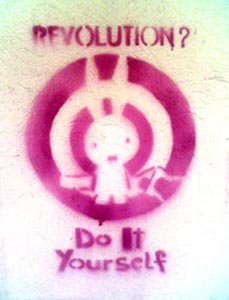 Recensione del nuovo libro di Michael Hardt Thomas Jefferson - The Declaration of Indipendence, tratto da Red Pepper Rewiew.
Recensione del nuovo libro di Michael Hardt Thomas Jefferson - The Declaration of Indipendence, tratto da Red Pepper Rewiew.It might seem strange to read Thomas Jefferson, the principal author of the US Declaration of Independence, as ‘a figure of modern revolutionary thought.' This, however, is precisely what Michael Hardt (co-author of the best-selling Empire with Italian political philosopher Antonio Negri) proposes in his new book. The work contains both an introduction to Jefferson’s thought, as well as a selection of his original writings.
Thomas Jefferson has long been connected to Enlightenment ideas (particularly those of John Locke, who famously argued that human beings possess certain ‘inalienable rights’) as well as the idea of republicanism (broadly speaking: an opposition to oligarchy, dictatorship and aristocracy; and the valuing of notions of civic virtue, liberty and rule by the people). Hardt, however, takes things a step further arguing that the very core of Jefferson’s political thought is a project for a radical form of democracy.
Hardt and Negri claim that their book Empire provides a ‘toolbox’ for theorising and acting inside and against today’s networked form of global command and control. Sharing an approach to theory with French post-structuralist philosopher Gilles Deleuze, ideas are picked up and applied where they prove useful, and set aside again where they are not. It is this toolbox approach that Hardt takes to Jefferson, who he grants was an unsystematic, often contradictory thinker, and at times deeply reactionary and racist (his racism against Native Americans was exceeded only by that towards black slaves). ‘The point,’ Hardt explains, ‘is not to give a balanced picture of Jefferson’s thought as a whole [but] to discover and learn from what remains revolutionary.'
If human nature exists
For Hardt, it is Jefferson’s concept of transition that allows us to see most clearly what he has to offer contemporary revolutionary thinking. And it is here that certain resonances can be found with Lenin (granted: much more his thought than practice).
At the core of Hardt’s argument is that ‘human nature’ has often, mistakenly, been conceived as something essential and static – including within the revolutionary tradition. On the one hand, social democratic forces have approached humanity with scepticism. In their conception, the state must play and maintain a strong role in the transition from capitalism to a new society, reconciling conflicting classes. There is to be a permanent division between the rulers and the ruled. On the other hand, the anarchists have tended to take a naïve approach, regarding humanity as always already capable of self-rule. The only obstacle is class domination and state power, both of which can be overcome in a single stroke: their smashing in the revolutionary event. With transition, whereas in the social democratic conception there is a continuous process of reform without a revolutionary event, for the anarchists it is punctual and absolute, occurring overnight.
Both Lenin and Jefferson are said to take a middle position. Or rather, they reject the false opposition entirely. If ‘human nature’ exists at all, it is neither ‘good’ nor ‘bad.' Rather, it changes and develops over time, determined by broad processes of social development. The Jeffersonian-Leninist approach to social change is sought through both rupture and duration: ‘a historical break that opens a new historical process’. The state, in other words, is ‘withered away’ whilst the multitude gradually trains itself in democratic self-rule. The moment of rupture does not signify an end, but part of a process. It is repeated repeatedly, driven forward by ever more democratic forms overthrowing and replacing one another. It is this logic that enabled Jefferson to support those who rebelled even against the very government he helped create.
Whilst there is certainly much to be said for the toolbox approach to social theory, it comes with its own dangers. For example, by teasing out particular elements of Jefferson’s thought – such as taking the ‘constituent power’ of resistance from below, rather than the ‘constituted’ form of power represented by the state (even a post-revolutionary state), as the primary space from which the desires of the multitude are legitimately articulated – he can indeed by presented as a radical democratic thinker. The methodological problem here is that not treating his thought systematically runs the risk of important limits becoming obscured. For example, Jefferson found it difficult to conceptualise equality despite difference in human relations. Despite, famously, finding slavery morally problematic, Jefferson (himself a slave owner) opposed abolition. Amongst his reasons was concern for the ability of the sovereign government – whose role was to enable self-rule – to maintain order in a climate where he believed serious racial antagonisms would unfold, not least as a result of the historic oppression of African Americans. Whilst he did not necessarily regard one race as superior or inferior to another, he had difficulty conceiving of a peaceful coexistence in conditions of equality (in Hardt’s language: ‘singularity within the common’).
The challenge Hardt sets us, then, is to try to read ‘Jefferson beyond Jefferson.' This means not only asking how his thought can be brought up-to-date and applied to our own globalised world, but also identifying the real obstacles in his thought, guiding the useful elements beyond these limits and trying to deploy them today. At a time when the ‘global movement of movements’ appears to have reached an impasse, perhaps it is precisely such a toolbox rereading of revolutionary thinkers such as Jefferson that a few tentative answers might after all be found.




Nessun commento:
Posta un commento